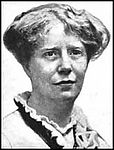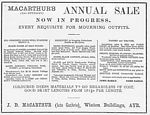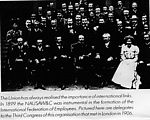 Mary Macarthur
Mary Macarthur Advertisement for Macarthur's drapery shop in the Ayr Advertiser
Advertisement for Macarthur's drapery shop in the Ayr Advertiser Mary at the 1906 International Federation of Employees (front right)
Mary at the 1906 International Federation of Employees (front right)

A meeting of the Shop Assistants' Union in Ayr was a turning point in Mary Macarthur's life. Until then she had shared her father's Conservative views. She was an active member of the Primrose League, an organisation for spreading Conservative principles in Great Britain. But such was the effect that the meeting had on Mary, that she took the first steps on a path, that led to her being one of the great personalities in women's trade unionism.
When Mary finished her education, she worked in one of her father's drapery shops as a bookkeeper. She also did some freelance journalism, and in 1901 she was asked to cover a Shop Assistants' Union meeting for a local Scottish newspaper. She expected to laugh at the proceedings, but was surprised by the emotions aroused by the speakers. As she said later, "I went to a meeting in Ayr to write a skit on the proceedings, going to scoff, I remained to pray. I became impressed with the truth and meaning of the Labour movement."
At that meeting, John Turner, who was secretary of the Shop Assistants' Union, managed to recruit Mary. At first she had been unsure, feeling that as the employer's daughter she ought not to join, but became a member shortly afterwards, and was later asked to be chairman of the new branch at Ayr. Within the year she had been elected as Scottish President. In 1902 she attended the Annual Conference of the Shop Assistants' Union in Manchester. It was here that she first met Margaret Bondfield, assistant secretary of the Union, and was elected as the first female representative on the Union's national executive committee.
In 1903 Mary attended the Scottish Trades Union Congress. She was just 23, and already an outspoken champion of the working classes. Speaking in support of a resolution for shorter working hours for shop assistants she said, " that the argument that had been brought against earlier closing was that it would interfere with the convenience of the working classes, but the working classes had again and again affirmed through such Congresses that they did not want their convenience at the cost of the health and lives of workers." She summed up her opposition to Lord Avebury's Bill, which she believed failed to protect shop workers with, " Lord Avebury might as well try to empty the Atlantic Ocean with a teacup as attempt to ameliorate the lot of shop assistants with his Bill."
Later that year Mary made arrangements to move to London. She intended getting a job as a shop assistant, and had written to Margaret Bondfield telling her of her plans. When she arrived in London she made her way to Margaret's small flat in Gower Street, above the Shop Assistants' Union offices. She stayed there for several weeks, sleeping on a sofa bed. She managed to get a job as a bookkeeper and secretary in Brixton, but Margaret knew that there was bigger work waiting for her.
The Shop Assistants' Union was affiliated to the the Women's Trade Union League. Margaret Bondfield was on its General Committee, and she knew that the W.T.U.L.was looking for a new secretary. When Margaret described the possibilities to Mary, " her eyes brightened, her breath came fast. The difficulties, great as they were, thrilled rather than alarmed her." (Hamilton, 1925, p22) Margaret took her to see Gertrude Tuckwell, Honorary Secretary and later President of the League. The task was to organise women, and empower them to help themselves; to believe that they can change things. There were several examples of dauntless spirit in the Matchgirls' Strike of 1889, and the laundresses ten years later. But the real challenge for the League was to sustain it, to convince women to retain union membership after the disputes had been resolved. Gertrude Tuckwell agreed with Margaret Bondfield that they had found the right person for the job in Mary. Mary's association with the Shop Assistants' Union continued for many years. The photograph included here shows her in attendance at the Congress of the International Federation of Employees, representing the National Amalgamated Union of Shop Assistants, Warehousemen and Clerks.
QUOTES
Margaret Bondfield
"When she came to meet me at the station , I was overcome with a sense of a great event. Here was a genius, allied to boundless enthusiasm and leadership of a high order, coming to build our little Union into a more effective instrument."
John Turner
"I visited Ayr to open a branch of the Union, and a fairly well attended meeting was held in a rather dark and dreary schoolroom in an obscure part of the town. Among those present I noticed an animated group of young ladies in the centre of the room, with a laughing, vivacious fair headed girl in their midst. I immediately turned my attention to them, and I remember even now that I felt I had got to arrest the attention of this part of the audience if we were to get a branch opened."
Robert Smillie (trade union leader)
"I well remember the first time I met Mary Macarthur. It was at a Labour Selection Conference held in Ayreshire.... She was a very young girl then, and though employed in her father's shop, she was an ardent and outspoken trade unionist. Her father was not pleased with her strange choice, but he put up with it, as he had evidently failed to break her faith either by argument or protest.... Mary told me in conversation that her father would 'thole' her as a trade unionist, but he would not stand her going out into the Labour political movement. When I was chosen as candidate, she told me she would go out and work for me... but I advised her not to run the risk of a break with her father, and that he would probably come round to her way of thinking ultimately. I am afraid she did not take my advice, as she came out to my meetings, and the rupture at home came."
Gertrude Tuckwell
Of her first meeting with Mary ......Margaret Bondfield "asked me to see a young Scottish girl, a member of the Shop Assistants' Union, who was she thought the essential person. So she came to my little Westminster flat bringing a tall slip of a thing dressed in black, very silent, but intensely attractive, with that air of subdued excitement which made one feel the air alive all round her, and herself mentally holding out both hands to adventure, adventure which always came."
Referring to Robert Smillie's account of the breach with her father...." Not very long afterwards she brought her shrewd and kind father to see me, and in her absence we talked of how best to give full scope to the genius of his whirlwind daughter."
On the successful conclusion of a debate on the Early Closing Bill ....."Mary's enthusiasm knew no bounds. Sitting on the forefront of the platform she leapt on a chair, discarding her hat, and wildly cheering, the plume of hair waving madly on that dear fair head, which was in so many future campaigns to prove a 'panache' to lead her followers to victory."
Rollover the captions in the box to see the available images in thumbnail format, click the caption to see the full-size image
| Reference: | 707 |
| Keywords: | |
| Archive Ref: | |
| Updated: | Tue 8 May 2007 - 13 |
| Interpretation written by | Barbara Harris |
| Author's organisation | |
| Organisation's website |